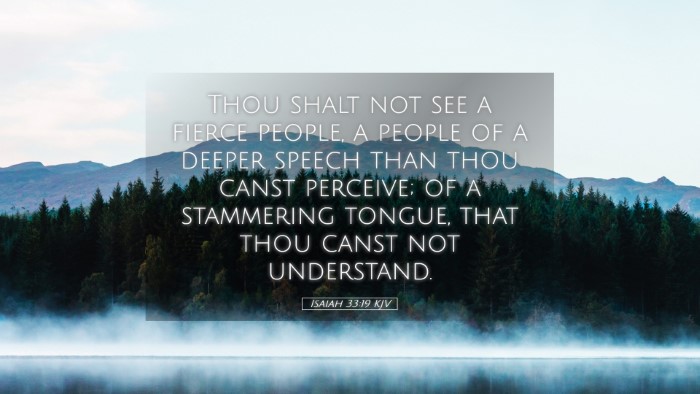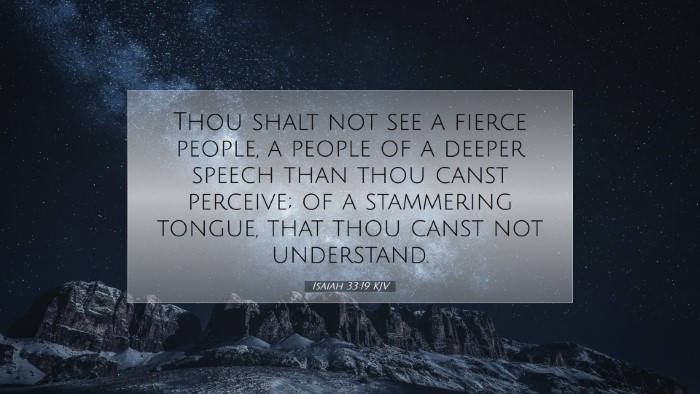Commentary on Isaiah 33:19
This verse states: "Thou shalt not see a fierce people, a people of a deeper speech than thou canst perceive, of a stammering tongue, that thou canst not understand." This passage is rich with theological significance and resonates deeply with themes of divine protection and the reassurance of God's people amidst the turbulence of oppression and foreign threats.
Contextual Overview
The Book of Isaiah is set against a backdrop of political unrest and moral decay in the nation of Judah. Isaiah prophesies during a time when Assyria threatens the stability of Israel and Judah, emphasizing God's sovereignty and the coming judgment. Chapter 33 reflects the hope and assurance offered to those faithful to God amidst the chaos.
Key Themes
- Divine Deliverance: This verse reassures the faithful that God will protect them from fierce and oppressive nations. Matthew Henry highlights that God’s people shall be shielded from the terror of invaders.
- Understanding and Communication: The reference to a "deeper speech" indicates a foreign tongue that is intimidating and incomprehensible. Albert Barnes elucidates that this signifies the alienation and confusion produced by those whose intentions are hostile to God's people.
- God's Sovereignty: In contrast to the nations that threaten Israel, the sovereignty of God guarantees safety and peace. Adam Clarke emphasizes that the oppressive forces will not prevail against the divine will.
Detailed Analysis
1. The Nature of the Oppressor: The phrase "fierce people" conjures images of brutal and relentless foes. Isaiah is no stranger to portraying adversaries in this light, as they symbolize the worldly powers that oppress the faithful. In describing them as a “deep speech,” Isaiah implies a complexity in their threats, both linguistic and cultural, which can intimidate and confound the unprepared.
2. The Assurance of Safety: The promise, "Thou shalt not see," serves as a profound reassurance. This reflects God's intent to shield His people from experiencing the full brunt of their adversaries' fury. Henry notes that this serves not only as a promise of physical deliverance but also spiritual peace among those who trust in God.
3. The Role of Divine Comfort: The mention of a "stammering tongue" can symbolize the confusion and uncertainty that surrounds the faithful when facing overwhelming odds. Clarke suggests this illustrates God’s active involvement, ensuring that His people do not need to engage with the fears and overwhelming threats posed by their enemies. The confusion of the oppressors can also be viewed as divine judgment against them.
Practical Applications
For pastors, theologians, and students of the Bible, this verse provokes critical reflection on themes of God’s protection, the nature of communication and understanding amidst hardship, and the imperative of trust in God over fear of human threats. Here are applications to consider:
- Shepherding in Times of Crisis: Church leaders can draw encouragement from this passage to provide assurance to their congregations during tumultuous seasons.
- Encouragement in Communication: The need for clear communication among believers is highlighted. Confusion can arise from external pressures; thus, churches should encourage clarity and unity in their message.
- Faith in Divine Justice: Believers are reminded never to fear the apparent strength of worldly powers. Trusting in God’s ultimate justice can bring peace in uncertain times.
Theological Reflections
This verse can also be viewed through the lens of New Testament themes. The notion of facing fierce opposition resonates with the Apostolic writings where believers are encouraged to endure trials (see Romans 8:31-39). Just as Isaiah reassured his audience of deliverance from the fearful nations, the church today finds security in Christ’s ultimate victory, which overcomes all worldly threats.
In conclusion, Isaiah 33:19 serves not only as a historical promise to ancient Israel but also as a timeless assurance to all of God's people. Today’s believers can take comfort in the truth that while the world may present fierce opposition and confusion, God stands as a protector and a source of divine wisdom, decisively outweighing the threats that seem formidable.


